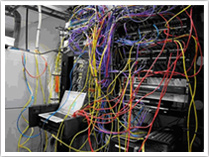| What is Cloud Hosting? |
 |
| Cloud Hosting is a service which provides a customer with a virtualized server or servers for their exclusive use from a provider's data center. There are three basic delivery models; Public, Private and Hybrid Cloud Hosting. |
Public Cloud Hosting
|
| Pool of shared computer resources and storage provided to the customer in single instance virtualized servers. |
| EXAMPLES: Amazon, Rackspace, or MasterTel's Cloud Server Store (less expensive than all). |
| PROS: Inexpensive, speedy deployment, high availability. |
| CONS: Resources are not guaranteed, real customer isolation is lacking, limited security options, limited private networking options, limited back up options and typically a linear pricing model. |
| BEST USE: Content / Web Site Hosting, Test Environments, Bulk Computing. |
Private Cloud Hosting
|
 |
| Dedicated servers and storage in the service provider network provided to the customer often with a virtualization layer. |
| EXAMPLES: Rackspace, Hosting.com, Savvis, IBM |
| PROS: Completely private with private VLANS and security, Guaranteed Resources, Total control of Hypervisor layer |
| CONS: Doesn't have high availability by default, not scalable, more expensive |
| BEST USE: Enterprise application hosting, Virtualized networks / file sharing, Compliance / Regulatory requirements. |
Hybrid Cloud Hosting
|
| Combination of public and private hosting "best of both worlds". Data and apps that require security and control reside in the private cloud, while web content, media and bulk processing happen in the public cloud. |
| EXAMPLES: Most providers have a product or are rushing to develop a hybrid offering to get in the game. |
| PROS: offers the best advantages of public and private cloud. |
| CONS: Complicated networking, Adds "art" to the application structure, additional considerations make it the most expensive option. |
| BEST USE: End to end architecture in the cloud |
| …or ask about NEW VIRTUAL PRIVATE CLOUD HOSTING Options – Public cloud infrastructure with true isolation between customers by establishing virtual switches at the Hypervisor layer. Provides end to end virtual LAN (or VLAN), inside the public cloud. Provides Integration of private network (MPLS/VPN), security, virtual desktops and applications. |
| PROS: High availability and pooled resources of public cloud. Offers security, privacy, flexibility and guaranteed resources of private cloud. Less complicated networking than hybrid cloud. Less expensive than private and hybrid cloud. |
 |
| BEST USE: Outsourcing internal network servers and Enterprise applications and more. |
